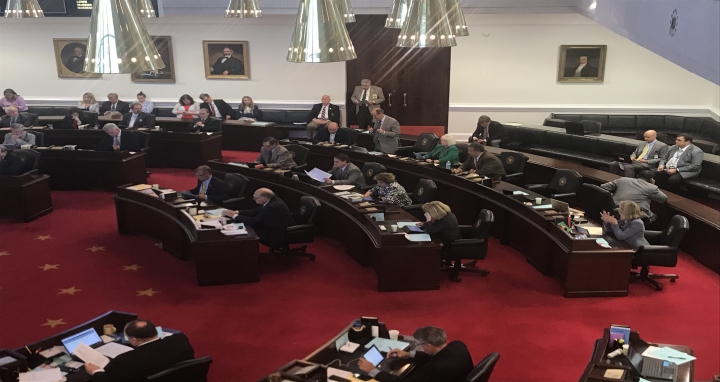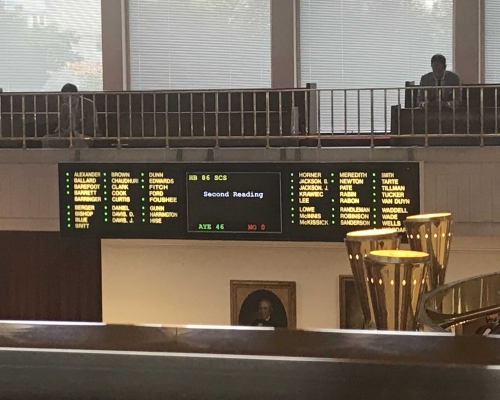North Carolina rightfully regards itself as a leader in innovation and as a hub for technology—it hosts Research Triangle Park and world-renowned universities, and according to the NCTech’s 2018 State of Technology Industry Report, it has the nation’s second-fastest rate of technology industry employment growth.
Likewise, North Carolina has also built a tremendous reputation as a leader in the financial services market. Until losing the title in 2017, Charlotte had long been ranked the nation’s second-largest banking center based on the value of loans and other assets held by area banks.
Given the state’s track record for winning accolade after accolade for its capabilities in these areas, many would be surprised to learn that the most notable product created by the convergence of these two industries—virtual currency powered by blockchain technology—was almost inadvertently regulated out of North Carolina.
The Problem
Interestingly, the problem was born out of legislation enacted in 2016 which, at the time, was considered very progressive and even supported by the virtual currency industry. The North Carolina Money Transmitter Act ("2016 Act") was a significant piece of consensus legislation that modified North Carolina's regulatory framework for money transmitters operating in the state, including traditional money transmitters like Western Union, banks, and credit unions, and, for the first time, established specific regulations for virtual currency transmitters operating in North Carolina.
The 2016 Act was one of the most progressive money transmitter laws in the country and one of the first state statutes to specifically recognize virtual currency, allowing virtual currency exchanges to become licensed by the North Carolina Commissioner of Banks. The Chamber of Digital Commerce announced that it was pleased with the 2016 Act.
In 2016, almost no one could have predicted the exponential increase in value that virtual coins like Bitcoin and Ether would experience over the next 18 months. In June 2016, one Bitcoin was worth about $650 but, by December 2017, that same single Bitcoin had grown in value to $17,600. Similarly, one unit of Ether was worth about $10 during most of 2016, but by January 2018, it had reached a peak value of $1,300 per unit.
The 2016 Act requires all companies transmitting or holding money in North Carolina to be licensed by North Carolina as money transmitters before offering their services to consumers. Additionally, the 2016 Act required that virtual currency exchanges maintain on hand, at all times, permissible investments in an amount equal to the licensee’s outstanding money transmission obligations.
It was later determined that licensees could only satisfy the 2016 Act's permissible investment requirement with currency owned by the licensed virtual currency exchange itself, and that currency held by the exchange on behalf of a user was not sufficient. In other words, exchanges would be required to match the value of their users’ coin investments and hold those coins in reserve just to satisfy North Carolina’s permissible investment requirements.
When Ether was worth $10 per unit and very few North Carolinians owned any virtual currency, the matching requirement would have been practical. But by December 2017, North Carolinians collectively held over $300 million worth of virtual currency in exchanges, so requiring exchanges to match that level of investment, just to comply with one state law, was de facto regulating them all out of business.
The 2018 Solution
Ward and Smith was contacted by one of the world’s largest virtual currency companies, who sought our help to fix the 2016 Act. Although the 2018 Regular Session of the North Carolina General Assembly would not begin for several months, we knew that we needed to get to work immediately in order to cultivate support for a solution for such a complex issue and recruit the right allies in the General Assembly.
We explained to legislators that North Carolina would never impose a burden on a more traditional business to set $300 million worth of capital in a reserve account just to check a state regulatory box. Even if a company had that amount available for such a purpose, it clearly could be put to many other better business uses. If all 50 states had laws like North Carolina’s, the cost to comply would easily be billions of dollars.
We also explained to legislators that North Carolina was very much an outlier in its licensee requirements when compared to regulatory frameworks in other states. Only two other states —Wyoming and Hawaii—imposed this matching investment requirement on their virtual currency exchanges, and before North Carolina’s 2018 legislative session began, legislation had already been filed in both of those states to fix their laws. During North Carolina’s 2018 Session, Wyoming passed its bill removing the matching requirement leaving only Hawaii and North Carolina with this onerous legislation on the books.
Acknowledging that the consequence of the 2016 Act, as written, was unintended, the sponsors of the 2016 Act quickly stepped up to help resolve the problem. In particular, Representative Stephen Ross and his staff made it one of their top priorities to ensure correction of the law this year.
Even with the support of the most well-respected thought leaders in North Carolina, the fix faced a significant uphill climb to enactment. Major hurdles to its passage included general skepticism of virtual currency and lack of appetite in a critical election year for legislation outside legislators' comfort zones. But the biggest hurdle of all was that the 2018 legislative session would likely become one of the shortest "Short Sessions" of the North Carolina General Assembly in modern history. Although approximately 2,000 bills were filed during the current legislative biennium, only a very small fraction of them have been enacted this year.
Losing access to virtual currency at this stage in the rise of Bitcoin, Ether, Litecoin, and blockchain technology, in general, would have serious impacts across North Carolina. From millennials to baby boomers, more North Carolinians are including virtual currency in their investment portfolios. Coin ownership and interest is no longer just a fad for technology enthusiasts and young people. For example, my retired parents who live in rural North Carolina bought several types of virtual currency more than a year ago on the advice of their investment advisor. More than 100,000 North Carolinians now own virtual currency, and the collective value of those coins is in the hundreds of millions of dollars. Coinbase, the largest virtual currency exchange in the United States, now has more account holders than Charles Schwab.
Virtual currency isn't only an investment vehicle. More retailers and service providers are accepting virtual currency for payment each day. Your sandwich at Subway, a handmade item from Etsy, your new chair from Overstock.com, a pair of earrings from Reeds Jewelers, groceries from WholeFoods, lunch at KFC, and even your Dish Network TV bill can now all be paid for with virtual currency.
Even Ward and Smith announced this month that we would begin accepting Bitcoin as payment for legal services rendered.
North Carolina Lawmakers Listened

Often citing the rise in popularity of virtual currency for these uses in our conversations with legislators, we did our best to send the message that North Carolina would inadvertently remove itself from this emerging industry if we could not resolve the issue created by the 2016 Act.
Our lawmakers were busy. Their days were long because this year’s Short Session was so short. Thousands of bills were clamoring for their attention, but they made time to listen. Most of them are very passionate about doing the best they can for their constituents, and they realized that losing the virtual currency industry would do those constituents a great disservice, either now or in the future as its popularity continues to expand.
Without the legislative fix, exchanges would begin leaving the state, and North Carolina coin investors would be forced to withdraw their virtual currency investments at a time not of their choosing, not in alignment with their investment strategy, and possibly at an inopportune moment in terms of their coins’ value.
 In the face of these possible negative outcomes, and in a political environment where almost no legislation, regardless of how worthwhile, was able to gain traction, North Carolina lawmakers voted to pass House Bill 86-Virtual Currency Exchanges ("House Bill 86") on June 12, 13, and finally on June 14. On June 22, Governor Roy Cooper signed House Bill 86 into law, making it only the 23rd bill enacted in 2018. Upon receipt of Governor Cooper's signature, the bill's changes were effective immediately.
In the face of these possible negative outcomes, and in a political environment where almost no legislation, regardless of how worthwhile, was able to gain traction, North Carolina lawmakers voted to pass House Bill 86-Virtual Currency Exchanges ("House Bill 86") on June 12, 13, and finally on June 14. On June 22, Governor Roy Cooper signed House Bill 86 into law, making it only the 23rd bill enacted in 2018. Upon receipt of Governor Cooper's signature, the bill's changes were effective immediately.
House Bill 86 removes the requirement that exchanges match their users’ investments, and by doing so, makes it possible for the exchanges to operate under North Carolina’s regulatory framework.
Without the exceptional leadership of Representative Stephen Ross and the assistance of Senator Jeff Tarte, Senator Dan Bishop, Senator Rick Gunn, Senator Bill Rabon, Speaker of the House Tim Moore, Representative Jon Hardister, and their wonderful staffs, this critical legislation would not have been possible.
The virtual currency industry and North Carolina coin owners and investors all owe them a great debt for their efforts. Coinbase thanked the North Carolina General Assembly for their efforts here.







